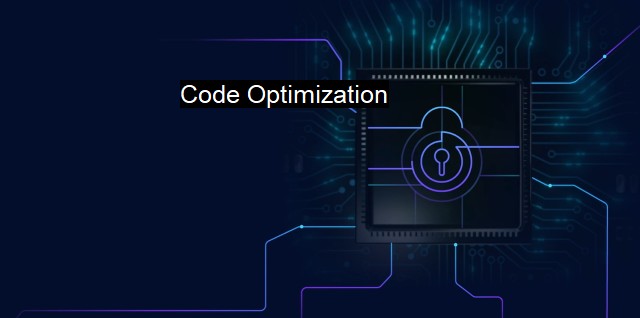What is Code Optimization?
Optimizing Code for Increased Cybersecurity: Enhancing Performance and Efficiency in Antivirus Solutions
Code optimization refers to a computer programming phase in which a code is refined and tweaked to enhance overall system performance in terms of speed and operation. Optimized codes are far superior to ordinary codes, decrease redundancy across systems, and are matched with the necessary system demands. code optimization tends to provide improved stability and can abate or outright eradicate any bottlenecks within the software programming framework, causing an incremental hike in the software's simplicity, quality, and productivity.Though code optimization is indisputably crucial in diverse computational disciplines, security strategists frequently stress its necessity when considering cybersecurity and antivirus aspects. optimized code is an integral component in making a program secure against any potential threats, as well as enhancing the speed of detecting and dealing with those threats. Robust code optimization techniques form a bulwark protecting against threats, reducing the possibility of software crashes, and subsequently reinforcing the resilience of the system.
Optimized code forms the cornerstone of an effective antivirus application, and it enhances overall efficiency. It isn't hard to see why. Highly optimized codes process data at maximum throughput and minimum latency, which renders detection and subsequent elimination of viruses and other threats faster, ensuring system integrity.
Even more security-oriented advantages of well-optimized codes exist. An optimized code essentially helps to harden the security of any program, creating hurdles and eliminating loopholes that hackers could exploit. it leads to the minimization of hidden bugs and vulnerabilities, given that optimized code is less likely to create room for latent threats hidden away in lesser elegant code. Key among these are such elements including the frequency and efficiency in software patching, system updates, and other forms of routine system checks.
Another benefit of code optimization from a cybersecurity pov involves restricting the system's attack surface. That implies reduction or total avoidance of any unnecessary functionalities that become potential openings for cyber-attack vectors. Malicious cyber actors would use these applications and programs to puncture through firewalls and other security protocols. The pruning of off-plane programs and adequately structuring the processes to conform to the operational requirements goes miles in securing the system.
Particularly for antivirus software, superior code optimization ensures prompt updating, lowers false positives, and improves the software management of system resources. High speed is a key driver for real-time performance in the field of antivirus operations, given the high rate of malware adaptation and the hazardous potential common to most high-functioning viruses. Optimized code drastically curtails the time span of viral detection and accordingly assists in keeping up with rapidly emerging threats.
This lends an essential weighting to code optimization procedures and structured analysis when developing highly efficient applications within cybersecurity and antivirus realms. Further, to maintain an optimal and robust ecosystem, it's also indispensable to keep sight of other measures such as network security infrastructure, continuous proactive monitoring, encryption techniques, and better password management procedures.
In sum, code optimization is, in a real sense, an art of structured programming done with the objective of attaining the most effective version of the code—both performance-wise and security-wise. It is an indispensable scale in the complex yet exhilarating domain of computer science, particularly in the fast-growing field of cybersecurity and antivirus systems.

Code Optimization FAQs
What is code optimization?
Code optimization is a process of improving the code efficiency and reducing its execution time while maintaining the same functionality. In cybersecurity and antivirus, code optimization can help to minimize the attack surface by reducing the number of vulnerabilities in the code.Why is code optimization important in cybersecurity and antivirus?
Code optimization is crucial in cybersecurity and antivirus as it can help to improve the performance and reduce the response time of the system. It also helps to minimize the system's attack surface by eliminating unnecessary code, reducing the number of potential vulnerabilities, and making it harder for hackers to find loopholes in the system.What are the common techniques for code optimization in cybersecurity and antivirus?
There are various techniques for code optimization in cybersecurity and antivirus, including reducing the number of system calls, optimizing loops and branching, minimizing memory allocation and deallocation, and optimizing data structures. Other techniques include using efficient algorithms, minimizing I/O operations, and reducing the size of the executable code.How can code optimization help to prevent cyber attacks?
Code optimization can help to prevent cyber attacks by minimizing the system's attack surface and reducing the likelihood of vulnerabilities. It can also make it harder for attackers to exploit any vulnerabilities that do exist by making it difficult to find and exploit the vulnerable code. Code optimization helps to reduce the code complexity, making it easier to understand and review the code for potential vulnerabilities. It also helps to improve the code performance, allowing the system to handle more requests and reducing the likelihood of denial-of-service attacks.| | A | | | B | | | C | | | D | | | E | | | F | | | G | | | H | | | I | | | J | | | K | | | L | | | M | |
| | N | | | O | | | P | | | Q | | | R | | | S | | | T | | | U | | | V | | | W | | | X | | | Y | | | Z | |
| | 1 | | | 2 | | | 3 | | | 4 | | | 7 | | | 8 | | |||||||